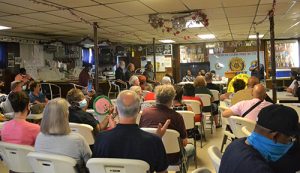
BERLIN– Area residents shared their views on race relations during a conversation hosted by the Worcester County NAACP this week.
In front of a crowd of local residents as well as visitors participating in the “Maryland’s Freedom Summer” bus ride, Black residents talked about their experiences living on the Eastern Shore and ways to ensure racism was a thing of the past.
“How do you do it?” said James Purnell, the first African American Worcester County Commissioner. “We have to work together. It’s going to take all of us to accomplish anything.”
Dozens gathered at American Legion Post 231 Monday for the discussion hosted by the Worcester County NAACP. Panelists, including Berlin Councilwoman Shaneka Nichols, Pocomoke City Councilman Todd Nock and longtime Worcester County resident Doretha Davis, were asked a series of questions focused on race relations. Though they expressed disappointment with police actions during a June 12 incident in Ocean City, most of their comments addressed broader issues. When asked if the American justice system was biased against non-white people, Davis said it was.
“But at the same time the American justice system became very different against anyone that doesn’t have any money,” she said. “I work with all different kinds of people, if you’re poor and you’re white, your justice is the same as mine.”
Nock, recounting the way he was pulled over while driving last year, disagreed.
“There have been times I have been stopped, not for doing anything, but just because I was driving while Black…,” he said. “We are still held to a lower standard than white people, whether they’re rich or poor. Try being poor and being Black.”
“Try being educated and Black,” Nichols said.
As far as training to de-escalate situations, panelists offered various insights. Davis said people should consider the other person’s point of view.
“De-escalating a situation only requires you to know how to talk to human beings,” she said.
Nock said there was no training for racism.
“Racism is something that is embedded in people,” he said. “But the one thing that can change is accountability. What needs to happen is when we hire these police officers as elected officials, we have to start making sure our police department reflects our demographics.”
He said if a town was made up of 50% African American residents, its police force should be made up of 50% African American officers.
Nichols pointed out that human resources departments often said African Americans weren’t applying for jobs.
“A lot are applying,” she said, adding that in some cases, minor infractions from an individual’s juvenile years were held against them.
Davis said she thought community policing — officers knowing and interacting with people in the community — would help with volatile situations.
“De-escalating a problem starts prior to you engaging with the person,” she said.
Nock said the problem with that was that officers who might have engaged with an 8-year-old Black boy were intimidated when they encountered that boy as a teenager.
“Black men aren’t seen as a threat until they become a teenager,” he said.
Davis objected.
“Policing starts when you know the kids,” she said.
When asked how to get minorities in good paying jobs in Worcester County, Nock encouraged minorities to run for office.
“It can’t just be us anymore,” he said. “We have to start running for office. We need to get ourselves in position where we can pull up the people that are getting left behind.”
Nichols too urged African Americans to get involved, whether it was as an elected official or as a committee member.
“Right now, in the town of Berlin we are taking applications for every single committee,” she said. “My mayor said to me ‘I’m a little worried because there’s no representation showing up to apply from District 3 and 4.’ Let me make that clear for you. There’s no representation showing up from our brown and black community. I’m concerned. Please reach out. My comments to the folks in this town — get up, stand up, speak up, be a part. If you don’t speak up for yourself who is going to? If you don’t emulate and model for those young men and women that this can be done, change can’t happen, they’re not going to know. The same way you model bed time, meal time, shower time, respect, model for them the way to be an active participant in your community.”
Purnell recalled his time as an elected official and said positive changes had been made in recent years but encouraged everyone to continue working together.
“We’ve come a mighty long ways, but we’ve got a long way to go and we’ve got to do it together,” he said.

